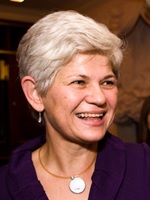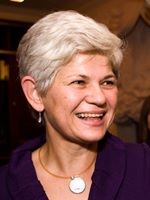(English below)
Fjórði fyrirlestur vormisseris í hádegisfyrirlestraröð RIKK verður fluttur í stofu 101 í Odda fimmtudaginn 25. febrúar, kl. 12. Fyrirlesari að þessu sinni er Irene Dankelman, vistfræðingur og dósent við Radboud-háskóla í Nijmegen í Hollandi. Hún er jafnframt framkvæmdastjóri IRDANA, ráðgjafafyrirtækis í sjálfbærri þróun sem leggur sérstaka áherslu tengslin milli kyns og umhverfis. Hún er ráðgjafi Sameinuðu þjóðanna (UN Women, UNEP, FAO, UNESCO), ESB, opinberra stofnana og félagasamtaka um kyn og umhverfis-/loftlagsmál og hefur haldið fjölda fyrirlestra og birt bækur á þessu sviði. Árið 1988 gaf hún út sína fyrstu bók, Women and Environment in the Third World og 2010 birtist bók hennar Gender and Climate Change: an introduction.
Hún hefur að auki starfað sem sérfræðingur og ráðgjafi fyrir fjölda félagasamtaka, þar á meðal Oxfam-Novib, samtök sem berjast gegn fátækt í heiminum, Alþjóðanáttúruverndarsambandið (IUCN-Netherlands), WEDO (Women’s Environment and Development Organisation), WECF (Women in Europe for a Common Future), Stichting wAarde (foundation value earth) og Both ENDs (Environment and Development Services for NGOs). Hún hefur einnig tekið þátt í alþjóðlegri samningagerð um umhverfismál, loftslagsbreytingar og sjálfbæra þróun.
Í fyrirlestrinum mun Irene beina sjónum aftur til níunda áratugsins þegar skilningur á sambandi kyns og umhverfismála var að vakna. Þessi nýi skilningur varð undirrót margvíslegs feminísks aktívisma sem beindist að því að samþætta félagsleg málefni inn í stefnumörkun og framkvæmd umhverfismála og sjálfbærrar þróunar. Árangurinn er misjafn. Það er aðeins á síðastliðnum 15 árum sem samfélagsleg og menningarleg áhrif loftlagsbreytinga hafa verið viðurkennd og um leið mikilvægi þess að skoða sérstaklega afleiðingar þeirra fyrir líf kvenna og þess að þær séu fullir og virkir þátttakendur í baráttunni gegn þeim. Á þessum tíma hafa samtök sem samtvinna áherslu á konur/kyn og loftslagsbreytingar átt stóran hlut að máli þegar kemur að því að taka kynjavíddina inn í stefnumörkunarviðræður og aðgerðaráætlanir, nú síðast í desember á loftlagsráðstefnunni í París. Þó að niðurstaða hennar hafi verið léttir fyrir marga, er hún gagnrýniverð ef litið er til kynjasjónarmiða. Irene ræðir hlutverk ýmissra hagsmunaaðila og stofnana í innleiðingu kynjasjónarmiða í loftlagsaðgerðir og hlutverk og áskoranir akademíunnar í þessu tilliti.
Fundarstjóri er Auður H. Ingólfsdóttir, lektor við Háskólann á Bifröst.
Fyrirlesturinn er fluttur á ensku, er öllum opinn og aðgangur er ókeypis.
Viðburðurinn er á Facebook!
Hádegisfyrirlestraröðin á vormisseri 2016 er haldin í samvinnu við Þjóðminjasafn Íslands og UNU-GEST, Alþjóðlega jafnréttisskóla Háskóla sameinuðu þjóðanna.
Gender and Climate Change: the story of our lives
RIKK’s fourth lecture this semester will be given on 25 February at 12 o’clock in room 101 in Oddi. The lecturer is Irene Dankelman, ecologist by background, and director of IRDANA advice on gender and sustainable development, and lecturer at the University of Nijmegen (Netherlands). During her more than 35 years professional life, she has worked for, a.o., UNIFEM (currently: UN Women) and Oxfam-Novib, IUCN-Netherlands, the Agricultural University in Wageningen and the Free University in Amsterdam. She was and is also actively involved in international, national and local organizations, including WEDO (Women’s Environment and Development Organisation), WECF (Women in Europe for a Common Future), Stichting wAarde (foundation value earth) and Both ENDs (Environment and Development Services for NGOs), and took part in international environmental, climate change and sustainable development negotiations. She advices the United Nations (UN Women, UNEP, UNDP, FAO, UNESCO), EU, government agencies and non-governmental organizations on gender and environment/climate change issues and has lectured and written extensively on the issue, starting with the book ‘Women and Environment in the Third World’ (Earthscan, 1988; with Joan Davidson) and the book ‘Gender and Climate Change: an introduction’ (Earthscan, 2010). Irene has worked in many countries in the world, with a focus on Asia.
In her presentation Irene goes back to the 1980s/1990s, when understanding of the relation of gender and environment was beginning to grow. This gave impetus to a wide range of feminist activism – focusing on the inclusion of social dimensions in environment and sustainable development policies and actions. Results have been mixed. It is only for about 15 years that the effects of climatic changes worldwide are interpreted from a social perspective, and the importance of women’s full and meaningful participation has been recognized. Since that time women/gender-climate change organizations have played a crucial role in bringing a gender dimension to policy negotiations and mechanisms; most recently, last December, to the Climate Conference in Paris. Although the outcomes were a relief to many, from a gender perspective the analysis is critical. The role of diverse stakeholders in institutionalizing gender in climate actions, apart from NGOs, also UN and several governmental agencies, will be discussed as well as lessons and challenges for academia. Ultimately, what we strive for is gender and climate justice in all the realities where people live.
Moderator is Auður H. Ingólfsdóttir, assistant professor at Bifröst University.
The lecture is given in English, is open to everyone and admission is free.
The event is on Facebook!
The lecture series in the spring semester 2016 is held in collaboration with The National Museum of Iceland and UNU-GEST.

